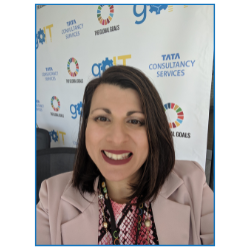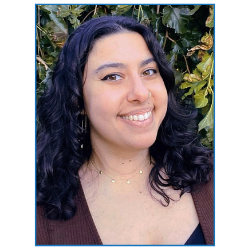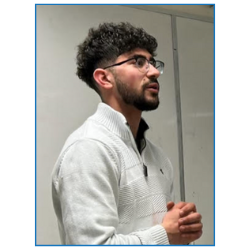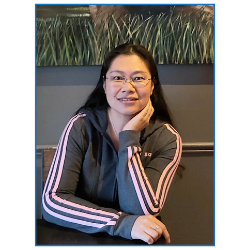AI in K-12 Education Conference: Shaping Future Classrooms
Overview
Artificial Intelligence (AI) will shape future classrooms. This fully online conference is for K-12 educators and administrators who want to lead the way. We will focus on 5 key areas areas: AI Literacy, AI Tools, Ethical Issues, Key Subject Areas, and Teaching and Learning. Start your journey to becoming a leader in AI in Education.
Dates
- Monday, April 29 to Wednesday, May 1
- Three time slots: 6 p.m., 7 p.m., and 8 p.m. (EST)
Cost
- Students: $25
- Non-students (before April 21): $30
- Non-students (after April 21): $50
Benefits
- Over 25 online workshops.
- Attend four or more sessions to receive a certificate of participation.
- A complimentary copy of the conference e-book full of practical suggestions and insights from each workshop.
Key Areas of Focus (K-12)
Our workshop guides will provide diverse insight into a wide range of topics, including:- AI Literacy: Starting out with AI
- AI & Key Subject Areas: ECE, English, Mathematics, and Visual Arts
- AI & Ethical Issues: Cheating, Culture, Deepfakes, Privacy, Influence on Women
- AI Tools: Canva AI, Chatbots, ChatGPT, MagicSchool
- AI & Learning: Engagement, Neurodiversity, Personalized Feedback, UDL
Artificial Intelligence and Education eBook Companion
Read the text-based companion to the Artificial Intelligence in Education Conference: Shaping Future Classrooms here.
Workshop Descriptions & Presenter Bios
⮦ Click on the presentation title to expand the description and learn more about each presentation and presenter.
Day 1 - Monday April 29, 6 p.m.
- chatOAME: How Ontario Math Teachers are Using a Specialized AI System
- Demystifying AI: A Beginner's Guide to Navigating your new Teacher Assistant
- Unlocking the Future: Inspiring Ethical AI Learning in Secondary Education!
- Revolutionizing Education: Humanizing the Classroom with AI
chatOAME: How Ontario Math Teachers are Using a Specialized AI System
We will look at actual prompts/replies that have been successful (or not) with a custom-designed OpenAI chat and how teachers have used their conversations to improve teaching and learning and save time (or not). The tool was designed by a non-profit organization led by educators for educators with the goal of ensuring access to a high-quality, pedagogical-sound, equity-oriented, Ontario-focused AI service. We will look behind the curtain of AI tools—how they are set up, the creation or avoidance of bias, failure and success—and see how well-designed generative AI tools aid teachers in their daily classrooms. Participants will receive a structured approach to engage with the AI, or they can go rogue and experiment with the AI. Questions, comments & feedback will be encouraged (answers may come afterwards depending on time).
- Themes: Assessment, How I've been using AI, Lesson planning, Specific AI Tool(s), Teaching Strategies
- Audience & Subject: General (All Grades); Mathematics
 Cal Armstrong is a long-time mathematics educator and board member of OAME, and his most significant earlier development project was what became the OneNote Class Notebook. He has been deeply engaged in technology and education for decades, and his primary motivations are to save teachers time, personalize the student experience and enhance the educational journey for both learners and teachers. He has worked with AI since 2017 and is excited to join the Generative AI project to aid OAME members. Outside the classroom & away from devices, he is an avid outdoorsman, a motorcyclist and an active volunteer in his community.
Cal Armstrong is a long-time mathematics educator and board member of OAME, and his most significant earlier development project was what became the OneNote Class Notebook. He has been deeply engaged in technology and education for decades, and his primary motivations are to save teachers time, personalize the student experience and enhance the educational journey for both learners and teachers. He has worked with AI since 2017 and is excited to join the Generative AI project to aid OAME members. Outside the classroom & away from devices, he is an avid outdoorsman, a motorcyclist and an active volunteer in his community.
Demystifying AI: A Beginner's Guide to Navigating your new Teacher Assistant
Are you new to AI? In this session, you’ll gain valuable insights into AI’s role as your personal teacher assistant, learn basic core concepts, and explore practical applications to revolutionize your classroom dynamics. Learn how to unlock AI’s potential for personalized, engaging, and effective education. Unravel the AI hype and navigate through the information overload of AI websites! Understand its role as a teacher assistant so you can generate curriculum-based lessons, units, and assessments in just minutes! Discover available AI education tools and their functionality. Learn the practical uses of AI to enhance your teaching and learning. Ensure responsible implementation of AI as your personal assistant. Join us for live AI tool demonstrations, real-world lesson planning examples, and interactive discussions. Leave empowered to support your fellow teachers as an AI expert!
- Themes: Engagement, Lesson planning, Specific AI Tool(s)
- Audience & Subject: Grades K-3, Grades 4-6, Grades 7-8; General
 Anu Bahri, a dedicated educator with 25+ years in Toronto's inner city schools, brings a wealth of experience as a K-12 Learning Coach for Toronto District School Board's Continuing Education department. Additionally, she was TCS's Education Consultant and Global Trainer for goIT, imparting invaluable insights to educators around the world. Anu's influence extends beyond borders; she's presented at numerous educational technology conferences and serves as a Teach SDG Ambassador, advocating for equity and diversity. With her deep-rooted commitment to education, Anu inspires educators globally, fostering inclusive classrooms and empowering students to innovate for a brighter future.
Anu Bahri, a dedicated educator with 25+ years in Toronto's inner city schools, brings a wealth of experience as a K-12 Learning Coach for Toronto District School Board's Continuing Education department. Additionally, she was TCS's Education Consultant and Global Trainer for goIT, imparting invaluable insights to educators around the world. Anu's influence extends beyond borders; she's presented at numerous educational technology conferences and serves as a Teach SDG Ambassador, advocating for equity and diversity. With her deep-rooted commitment to education, Anu inspires educators globally, fostering inclusive classrooms and empowering students to innovate for a brighter future.
Unlocking the Future: Inspiring Ethical AI Learning in Secondary Education!
The session focuses on teaching intermediate or senior grades. It is an excellent introduction for educators who are nervous about where to start with AI in their classroom. Specifically, by equipping you with the knowledge and resources you need to teach your students AI while offering some helpful advice and cautions. Get ready to participate in some fun discussions and engage with plenty of examples.
- Themes: Ethical challenges in using AI, How I've been using AI, Teaching Strategies
- Audience & Subject: Grades 9-12; Literacy
 Donna Farquharson-Goheen, M.Ed., is a secondary teacher and former consultant with PVNCCDSB. Her research interests are character education, ethics and religious education. With more than 15 years of expertise, Donna likes to challenge her pupils to participate in new learning projects. As Donna also likes to challenge herself, she is completing a second master's degree in religious education.
Donna Farquharson-Goheen, M.Ed., is a secondary teacher and former consultant with PVNCCDSB. Her research interests are character education, ethics and religious education. With more than 15 years of expertise, Donna likes to challenge her pupils to participate in new learning projects. As Donna also likes to challenge herself, she is completing a second master's degree in religious education.
Revolutionizing Education: Humanizing the Classroom with AI
This session is ideal for educators across all education levels seeking rejuvenation in their profession through relationship-building and effective delegation of tasks to AI. Educators should attend to discover how AI can transform their teaching by streamlining administrative duties and enriching classroom interactions. This session offers practical insights into leveraging AI for more meaningful educational experiences, fostering deeper connections with students and reigniting educators' enthusiasm for their profession. Discover how to use AI to streamline administrative tasks, deepen connections with personalized student learning, and rekindle your passion for teaching in an interactive and engaging session. Participants will connect via Google Meet for live interactive sessions and use Mentimeter for real-time feedback, enabling active engagement and interaction with the content. This blend of tools fosters a dynamic learning environment.
- Themes: Engagement, Special education, Teaching Strategies
- Audience & Subject: General (All Grades); Support for Educators
 Amanda Paul, M.Ed., is currently advancing her expertise as a doctoral student in educational leadership and policy at the University of Toronto OISE. At Servo Annex, she leads innovation and curriculum development, focusing on enhancing C-suite clients' educational and professional training through innovative technology. In addition to her role at Servo Annex, Amanda teaches business at a secondary school within the DDSB. Her passion for technology drives her to explore and implement innovative teaching methods, particularly in e-learning for adult education, aiming to elevate the teaching profession and provide impactful, relevant learning experiences to a broad audience.
Amanda Paul, M.Ed., is currently advancing her expertise as a doctoral student in educational leadership and policy at the University of Toronto OISE. At Servo Annex, she leads innovation and curriculum development, focusing on enhancing C-suite clients' educational and professional training through innovative technology. In addition to her role at Servo Annex, Amanda teaches business at a secondary school within the DDSB. Her passion for technology drives her to explore and implement innovative teaching methods, particularly in e-learning for adult education, aiming to elevate the teaching profession and provide impactful, relevant learning experiences to a broad audience.
Day 1 - Monday April 29, 7 p.m.
- Spells for Success: Promoting UDL and Differentiating Teaching Practices with Magic Tools
- From Chatbots to Triangulation: A New Teacher’s Guide to Navigating AI
- AI-Powered Personalized Feedback - Save Time & Spark Critical Minds
- AI Chatbot for Differentiated Learning
Spells for Success: Promoting UDL and Differentiating Teaching Practices with Magic Tools
Join us in this interactive workshop designed to empower educators with innovative strategies and "magic tools" for differentiated instruction. This session dives into creative methodologies and AI-enhanced resources that cater to diverse learning needs, ensuring every student's success.
- Themes: Administrative applications, Assessment, Engagement, Individual education plans (IEPs), Lesson planning, Special education, Teaching Strategies
- Audience & Subject: General (All Grades)
 Tricia Dwyer-Kuntz is an Academic Associate in the Faculty of Education at Ontario Tech University, teaching in both the B.Ed and B.A. (Educational Studies) programs. She came to this position after 30 years as a teacher, administrator and special education consultant in K-12. Her passion lies in inclusive education and technology integration for ALL students. Chosen by Apple to be an international Apple Distinguished Educator, she enjoys pushing technology to its limit, particularly in the area of accessibility.
Tricia Dwyer-Kuntz is an Academic Associate in the Faculty of Education at Ontario Tech University, teaching in both the B.Ed and B.A. (Educational Studies) programs. She came to this position after 30 years as a teacher, administrator and special education consultant in K-12. Her passion lies in inclusive education and technology integration for ALL students. Chosen by Apple to be an international Apple Distinguished Educator, she enjoys pushing technology to its limit, particularly in the area of accessibility.
 Dr. Stephanie Kuntz is a student at Ontario Tech University enrolled in the Master of Education program. She has a Doctor of Medicine from McMaster University and is a neurologist and clinician educator. She is completing a postgraduate fellowship in multiple sclerosis and neuroimmunology at St. Michael's Hospital in Toronto. Her interests lie in using AI and e-learning in medical education, particularly in minimizing burnout in undergraduate and postgraduate medical students.
Dr. Stephanie Kuntz is a student at Ontario Tech University enrolled in the Master of Education program. She has a Doctor of Medicine from McMaster University and is a neurologist and clinician educator. She is completing a postgraduate fellowship in multiple sclerosis and neuroimmunology at St. Michael's Hospital in Toronto. Her interests lie in using AI and e-learning in medical education, particularly in minimizing burnout in undergraduate and postgraduate medical students.
From Chatbots to Triangulation: A New Teacher’s Guide to Navigating AI
This session is ideal for teacher candidates, department heads, and instructors at the I/S level, providing them with authentic and recent examples of how AI usage is being addressed in the secondary school classroom. Have you, or new teachers you are working with, struggled to navigate how AI appears in the classroom? Are you seeking relevant insight from someone who has felt the same? If so, this presentation is for you! Participants will learn how AI appears in classwork, how to start using triangulation to address it, and how expectations-based rubrics can help build new teacher confidence and promote beneficial AI use. This session will have participant-focused polls, activities, and discussions to address classroom concerns regarding AI use and how to best support new (or seasoned!) teachers in addressing them.
- Themes: Assessment, Ethical challenges in using AI, How I've been using AI, Specific AI Tool(s), Teaching Strategies
- Audience & Subject: Grades 9-12; General, Literacy
 Marjan Mahmoudian (HBA, B.Ed, OCT) is a recent graduate from Ontario Tech University and a first-year English teacher in the York Region District School Board. Though her interests typically focus on the intersection between place-based, experiential, and anti-racist education, her first year of teaching has been centred around the rise of AI in the English classroom. With guidance and support from her department, Marjan has developed her abilities in using triangulation and expectations-based rubrics to address academic dishonesty and ensure equitable assessment. Marjan has recently shared her insights as a new teacher with English Department Heads. She hopes that sharing these experiences will inform new teachers and all those guiding them on how best to approach their practice in this ever-evolving pedagogical landscape.
Marjan Mahmoudian (HBA, B.Ed, OCT) is a recent graduate from Ontario Tech University and a first-year English teacher in the York Region District School Board. Though her interests typically focus on the intersection between place-based, experiential, and anti-racist education, her first year of teaching has been centred around the rise of AI in the English classroom. With guidance and support from her department, Marjan has developed her abilities in using triangulation and expectations-based rubrics to address academic dishonesty and ensure equitable assessment. Marjan has recently shared her insights as a new teacher with English Department Heads. She hopes that sharing these experiences will inform new teachers and all those guiding them on how best to approach their practice in this ever-evolving pedagogical landscape.
AI-Powered Personalized Feedback - Save Time & Spark Critical Minds
With a focus on high school and beyond, this presentation will help you learn how your students can harness AI for personalized feedback, especially in writing projects, promoting active learning and critical thinking while saving you time writing feedback! Learn how AI-powered feedback can save you time and ensure students apply personalized feedback immediately, fostering continuous engagement, critical thinking, and learning. No more wasted efforts or overlooked feedback! AI-powered feedback enables the immediate application of personalized feedback to a task or assignment, promoting active learning and critical thinking skills. No more waiting for teacher grading; students engage and grow in real time. I will use Nearpod to present, allowing participants to interact through polls and discussion questions, ensuring active participation and deeper learning.
- Themes: Assessment, Engagement, How I've been using AI, Teaching Strategies
- Audience & Subject: General (All Grades); Languages
 Kathleen Pierce is an Academic Associate at Ontario Tech University and holds an M.Ed in Adult Education. Inspired by the emergence of ChatGPT and the need to revamp her business communication courses, she passionately explores innovative AI education approaches. She focuses on equipping students with essential skills like critical thinking for an ever-changing landscape. Kathleen also teaches in Ontario Tech’s Continuous Learning “Generative AI for Leaders” Certificate program, emphasizing AI’s significance for industry leaders.
Kathleen Pierce is an Academic Associate at Ontario Tech University and holds an M.Ed in Adult Education. Inspired by the emergence of ChatGPT and the need to revamp her business communication courses, she passionately explores innovative AI education approaches. She focuses on equipping students with essential skills like critical thinking for an ever-changing landscape. Kathleen also teaches in Ontario Tech’s Continuous Learning “Generative AI for Leaders” Certificate program, emphasizing AI’s significance for industry leaders.
AI Chatbot for Differentiated Learning
This session will explore an educator-led conversational worksheet that saves educators 70% of their time creating interactive activities, requires no marking or grading, provides automated feedback for the student and educator on learning progress with learning objectives, and differentiates student learning within 10 minutes. These tools will fundamentally change the worksheet concept from static interaction to dynamic conversational-based learning. Participants will learn how constitutional AI and guardrails can be implemented to have students interact with it in a safe, controlled environment. Participants will engage in two live demos, including a conversational survey that will look at emotions within their text responses and go through a conversational worksheet to assess their AI literacy. These engagements will present how educators can use AI within their classrooms with a live demo.
- Themes: Assessment, Engagement, How I've been using AI, Specific AI Tool(s)
- Audience & Subject: General (All Grades); Languages, Literacy, Science & Technology, Social Studies, History & Geography, AI
 Aman Sahota co-founded Factors Education, and they created the first-ever educator-led conversational worksheet and survey. Factors was named the 2021 Canadian Educational Technology Startup of the Year and is working on personalizing learning through AI. Factors is a team led by youth entrepreneurs looking to change the education landscape by saving educators time and providing students with safe, controlled environments to interact with AI. Find more info at https://www.factors.world/
Aman Sahota co-founded Factors Education, and they created the first-ever educator-led conversational worksheet and survey. Factors was named the 2021 Canadian Educational Technology Startup of the Year and is working on personalizing learning through AI. Factors is a team led by youth entrepreneurs looking to change the education landscape by saving educators time and providing students with safe, controlled environments to interact with AI. Find more info at https://www.factors.world/
Day 1 - Monday April 29, 8 p.m.
- Deepfake and the Era of Synthetic Reality: Hands-on Voice Clone Activity
- Unleashing the Power of AI in Education
- MagicSchool AI - A Powerful Educational Tool
Deepfake and the Era of Synthetic Reality: Hands-on Voice Clone Activity
Presenters will provide an overview of a hands-on digital citizenship activity at TFS, exploring generative AI manipulations such as face swapping, synthetic images and synthetic audio. Students reflect on the social and ethical implications of AI and discuss the consequences of its use from legal and academic perspectives. Working in small groups, students write audio scripts for fictional characters in public or personal trust positions, including a city mayor and grandchild. Script recordings are uploaded as training data to create a generative AI voice clone model. Alternative messages are then typed into the demo AI tool, and the voice clone generates text-to-speech audio with varying degrees of accuracy. This hands-on high school activity engages students in authentic discussion about the implications of AI, focusing on key concepts of trust and identity.
- Themes: Ethical challenges in using AI, Specific AI Tool(s)
- Audience & Subject: Grades 7-8, Grades 9-12; General, Science & Technology
Presenters: Bob Tarle & Amjad Hassoun
 Bob Tarle is the Executive Director of Innovation & Technology at Toronto French School (TFS). He came to TFS from TFO and TVO, where he launched and grew a multi-platform incubator as Innovation Program Manager and Director of Innovation & Partnerships. Bob holds a bachelor of education from McGill University, a post-graduate diploma in new media from Sheridan College, and will complete a Master of Law degree in privacy and cybersecurity from Osgoode Hall Law School in 2024.
Bob Tarle is the Executive Director of Innovation & Technology at Toronto French School (TFS). He came to TFS from TFO and TVO, where he launched and grew a multi-platform incubator as Innovation Program Manager and Director of Innovation & Partnerships. Bob holds a bachelor of education from McGill University, a post-graduate diploma in new media from Sheridan College, and will complete a Master of Law degree in privacy and cybersecurity from Osgoode Hall Law School in 2024.
 Amjad Hassoun is a computer science student in his final year at the University of Toronto with a keen interest in AI and Education. He has collaborated with staff and student leaders at TFS to introduce AI tools and discuss their ethical and social implications at different grade levels. As a part of the reinforcement learning team at Outlier, Amjad also worked on analyzing and comparing AI models. Additionally, he has recently developed Q-Tools, an AI-powered Chrome extension for U of T students.
Amjad Hassoun is a computer science student in his final year at the University of Toronto with a keen interest in AI and Education. He has collaborated with staff and student leaders at TFS to introduce AI tools and discuss their ethical and social implications at different grade levels. As a part of the reinforcement learning team at Outlier, Amjad also worked on analyzing and comparing AI models. Additionally, he has recently developed Q-Tools, an AI-powered Chrome extension for U of T students.
Unleashing the Power of AI in Education
How will AI save me time and help me do my job? If that’s the question you’ve been asking yourself throughout all this AI crazy, this presentation is for you. This is the new normal, so let’s embrace it and understand how AI can work for us. In this presentation, we’ll use AI to create unit and lesson plans, map out assessments, and create growth plans for professional development. We’ll use AI to save time and energy by taking care of the broad strokes of lesson and unit planning, amongst other tasks. You’ll be left equipped to use AI the very next day. You’ll leave knowing the tools and how to use them to make the most of AI in your teaching practice.
- Themes: Administrative applications, Assessment, Engagement, How I've been using AI, Lesson planning, Specific AI Tool(s), Teaching Strategies
- Audience & Subject: General (All Grades)
 Mike Washburn is an educator, community builder, and Director of Learning Experiences for Logics Academy. Mike has worked with leading EdTech organizations to connect educators through community building and professional learning, enabling them to share their passions and knowledge. Mike co-hosted the hit education podcasts OnEducation and the official Minecraft: Education Edition podcast. With almost 500,000 career podcast downloads, Mike is a standout voice for technology in education, has written for EdSurge, and has been a notable, featured, or keynote speaker at conferences all across North America—such as ISTE and FETC.
Mike Washburn is an educator, community builder, and Director of Learning Experiences for Logics Academy. Mike has worked with leading EdTech organizations to connect educators through community building and professional learning, enabling them to share their passions and knowledge. Mike co-hosted the hit education podcasts OnEducation and the official Minecraft: Education Edition podcast. With almost 500,000 career podcast downloads, Mike is a standout voice for technology in education, has written for EdSurge, and has been a notable, featured, or keynote speaker at conferences all across North America—such as ISTE and FETC.
MagicSchool AI - A Powerful Educational Tool
Educators keen on AI-driven personalization in teaching will learn how MagicSchool AI can transform educational experiences. Discover how to leverage AI for custom learning paths, enhancing engagement and inclusivity in classrooms with MagicSchool AI. Learn to navigate MagicSchool to create engaging learning experiences and generate custom educational content on the fly. Interactive demos of MagicSchool AI, real-case scenarios, and collaborative workshops to apply AI tools in education.
- Themes: Administrative applications, Assessment, Engagement, How I've been using AI, Lesson planning, Specific AI Tool(s)
- Audience & Subject: General (All Grades)
 John Workman is a dedicated educator and facilitator passionate about leveraging technology to enhance learning. As a previous Additional Qualification Instructor for ETFO, he has played a significant role in the professional development of teachers, emphasizing the importance of integrating innovative teaching methods and technology in the classroom. John's commitment to educational excellence is evident in his work as a Durham District School Board professional development facilitator. His recent completion of the Artificial Intelligence for Teaching and Learning Certificate program at Ontario Tech University equips him with the latest knowledge and skills in applying AI in education. John's blend of practical teaching experience and expertise in generative AI technologies positions him as an insightful instructor for those interested in the transformative potential of AI in educational settings.
John Workman is a dedicated educator and facilitator passionate about leveraging technology to enhance learning. As a previous Additional Qualification Instructor for ETFO, he has played a significant role in the professional development of teachers, emphasizing the importance of integrating innovative teaching methods and technology in the classroom. John's commitment to educational excellence is evident in his work as a Durham District School Board professional development facilitator. His recent completion of the Artificial Intelligence for Teaching and Learning Certificate program at Ontario Tech University equips him with the latest knowledge and skills in applying AI in education. John's blend of practical teaching experience and expertise in generative AI technologies positions him as an insightful instructor for those interested in the transformative potential of AI in educational settings.
Day 2 - Tuesday April 30, 6 p.m.
- Teachable Machine & Critical AI Literacy: Teaching AI Bias
- Is AI Enhancing or Erasing Identity & Privacy in Education
- The Prompting Playbook: Strategies for AI Engagement
Teachable Machine & Critical AI Literacy: Teaching AI Bias
Teachable Machine is an innovative web-based application that requires no coding or sign-up. In this workshop, participants will have the opportunity to learn about the social and ethical implications of AI use and explore Teachable Machine through a demonstration of AI bias. During this workshop, participants can create their own Teachable Machine model and discover how it can help enhance student Critical AI Literacy. Explore the unique capabilities of Teachable Machine and investigate innovative and effective ways to incorporate it into your teaching practice. Participants will be better equipped to empower their students to be critical thinkers and responsible users of AI technology. This workshop best suits educators teaching grades 4-10, but all are welcome! Learning about Critical AI Literacy and exploring tools such as Teachable Machine can help start conversations on AI bias, machine learning, and social dimensions of AI in the classroom. Participants will create their own machine learning algorithm and see how AI bias can manifest (and be mitigated) in applications!
- Themes: Ethical challenges in using AI, How I've been using AI, Specific AI Tool(s)
- Audience & Subject: Grades 4-6, Grades 7-8, Grades 9-12; Science & Technology, Social Studies, History & Geography, Ethics, AI Education
Tess Butler-Ulrich is a Doctor of Education student at Ontario Tech University and an OCT-certified teacher. As a research assistant at the STEAM-3D Maker Lab, she focuses on maker pedagogies, STEM education, and AI. She recently completed her Master's degree, which focused on developing critical thinking and applied AI knowledge in youth. Her doctoral research expands on her previous work, focusing on teacher candidates, reflection, and critical AI literacy.
Is AI Enhancing or Erasing Identity & Privacy in Education
The target audience is any school librarian or educator looking for insight into transparency with AI, lessons on incorporating AI into the classroom, how to protect privacy/biometric data when using AI and whether AI is on pace to replace librarians (or educators in general) in the community. This session will give "voice" to those presently excluded from AI rollouts in education to help "coach" AI via feedback and critical analysis. This presentation will examine the biases embedded in AI from a community advocate perspective. School librarians are frontline advocates in their communities and education campuses. We offer a variety of resources ranging from mental health services and technology programs to literacy and community engagement activities. This session will ensure ethical, healthy and inclusive AI technology. The end goal is to leave with tools to advocate for equitable AI in your community, which is a healthy, protected experience. Additionally, participants will leave with resources on the positive & negative attributes of AI, lesson ideas & ready-made AI mental health tools to share. Join this session to coach AI for a more inclusive and healthy future! There will be a breakout activity on the "Online Disinhibition Effect" that factors into the mistakes AI algorithms make and miscategorized as safety threats.
- Themes: Engagement, Ethical challenges in using AI, How I've been using AI, Lesson planning, Specific AI Tool(s)
- Audience & Subject: Grades 7-8, Grades 9-12; General, Literacy, Science & Technology, Administrative leadership & policy creation.
 Jean Darnell, MLIS, is a Texas librarian who advocates for all students via her blog, AwakenLibrarian.com, where she shares lesson ideas, professional development and curriculum content to improve the diverse role of librarians of colour and the young adults they serve. She has an in-depth knowledge of technology that began in 2001, is a 2024 Pulitzer Center Teacher Fellow in the field of Artificial Intelligence, and is the 2023 Texas Library Association Intellectual Freedom Committee Chairperson. Jean has served on other national and local committees, including as a keynote speaker and panellist at various national and local conferences. Jean graduated from Baylor University (undergrad) and the University of Houston, Clear Lake (graduate school).
Jean Darnell, MLIS, is a Texas librarian who advocates for all students via her blog, AwakenLibrarian.com, where she shares lesson ideas, professional development and curriculum content to improve the diverse role of librarians of colour and the young adults they serve. She has an in-depth knowledge of technology that began in 2001, is a 2024 Pulitzer Center Teacher Fellow in the field of Artificial Intelligence, and is the 2023 Texas Library Association Intellectual Freedom Committee Chairperson. Jean has served on other national and local committees, including as a keynote speaker and panellist at various national and local conferences. Jean graduated from Baylor University (undergrad) and the University of Houston, Clear Lake (graduate school).
The Prompting Playbook: Strategies for AI Engagement
This presentation focuses on unlocking the full potential of your interactions with AI, fostering a new level of engagement and innovation. We will explore the transformative journey into the mechanics and nuances of crafting effective prompts to communicate with artificial intelligence, turning abstract ideas into tangible outcomes, making it an essential exploration for educators, marketers, developers, and business leaders. Furthermore, we will explore various types of prompts, from the simple to the complex, and understand the contexts in which they are most effective. Key topics include prompt engineering, response analysis, and feedback mechanisms to help participants develop their own playbook of strategies. By attending this session, you will elevate your AI communication skills to new heights and become a proficient navigator of the evolving landscape of artificial intelligence. Participants will learn through theoretical discussions and practical, hands-on exercises to enhance their AI communication skills. We will analyze real-world case studies, engage in collaborative projects, and experiment with different prompting techniques to understand their impact on AI behaviour and output.
- Themes: Ethical challenges in using AI, Teaching Strategies
- Audience & Subject: Grades 4-6, Grades 7-8, Grades 9-12; Digital media
 Joycelyn Kelly brings over 15 years of professional experience in corporate training, career development and workshop facilitation in the community and higher education. Joycelyn is passionate about student development, mental health and program delivery using emerging AI technologies. As a Program Instructor in the Artificial Intelligence in Teaching and Learning program in Continuous Learning at Ontario Tech University, Joycelyn enjoys connecting and applying emerging AI technologies in professional practice – teaching and learning. Her innovative approaches have significantly enhanced educational outcomes and student engagement. Joycelyn is a graduate of Ontario Tech University (BA Hons Educational Studies & Digital Technology) and is progressing with her research (AI and VR use for mental health in adolescent and post-secondary populations) in the Masters of Education program at Ontario Tech University.
Joycelyn Kelly brings over 15 years of professional experience in corporate training, career development and workshop facilitation in the community and higher education. Joycelyn is passionate about student development, mental health and program delivery using emerging AI technologies. As a Program Instructor in the Artificial Intelligence in Teaching and Learning program in Continuous Learning at Ontario Tech University, Joycelyn enjoys connecting and applying emerging AI technologies in professional practice – teaching and learning. Her innovative approaches have significantly enhanced educational outcomes and student engagement. Joycelyn is a graduate of Ontario Tech University (BA Hons Educational Studies & Digital Technology) and is progressing with her research (AI and VR use for mental health in adolescent and post-secondary populations) in the Masters of Education program at Ontario Tech University.
Day 2 - Tuesday April 30, 7 p.m.
- A Brave New World: The Perils of AI Image Generators for Women
- Embracing the New Palette: Integrating AI into Visual Arts Education
- Frenemies Unite: AI as an Educational Edge in the English Classroom
A Brave New World: The Perils of AI Image Generators for Women
This session will focus on AI's implications for girls and women and take a deep dive into Midjourney, a popular AI image generator. AI image generators are being used more frequently in and outside the classroom, so it is important to teach students how to examine their impact on their lives critically. AI image generators can help students add visual content to stories, presentations and other projects, but they also need to learn how to evaluate these tools critically. This session will explore how we can teach those AI literacy skills. Participants will explore critical AI literacy skills with Midjourney or another AI image generator.
- Themes: Ethical challenges in using AI
- Audience & Subject: General (All Grades)
 Dr. Janette Hughes is a Canada Research Chair in Technology and Pedagogy and Professor at Ontario Tech University. She is the recipient of multiple research and teaching awards and research grants. She is widely published and author of The Digital Principal, a guide for school administrators interested in promoting technology-rich learning environments for students and teachers. Dr. Hughes is a prolific author and presenter, sharing her work nationally and internationally in prestigious scholarly and professional journals, keynote talks, and conferences. Dr. Hughes is routinely contacted by school districts, Ministry personnel and industry partners to consult on a variety of topics, including online teaching and learning, equity issues in ed tech, creating innovative learning environments, establishing Makerspaces in schools, shifting pedagogies in a digital era and how to foster the development of global (21st century) skills and competencies in K-12 and higher education.
Dr. Janette Hughes is a Canada Research Chair in Technology and Pedagogy and Professor at Ontario Tech University. She is the recipient of multiple research and teaching awards and research grants. She is widely published and author of The Digital Principal, a guide for school administrators interested in promoting technology-rich learning environments for students and teachers. Dr. Hughes is a prolific author and presenter, sharing her work nationally and internationally in prestigious scholarly and professional journals, keynote talks, and conferences. Dr. Hughes is routinely contacted by school districts, Ministry personnel and industry partners to consult on a variety of topics, including online teaching and learning, equity issues in ed tech, creating innovative learning environments, establishing Makerspaces in schools, shifting pedagogies in a digital era and how to foster the development of global (21st century) skills and competencies in K-12 and higher education.
 Laura Morrison, Ed.D., is an Assistant Professor in the Faculty of Education at Ontario Tech U. Her work focuses on promising practices related to online education, inclusive maker pedagogies and critical digital literacies. Laura’s current grant-funded research explores the use of culturally sustaining maker pedagogies to increase engagement and learning for students typically underrepresented in STEM.
Laura Morrison, Ed.D., is an Assistant Professor in the Faculty of Education at Ontario Tech U. Her work focuses on promising practices related to online education, inclusive maker pedagogies and critical digital literacies. Laura’s current grant-funded research explores the use of culturally sustaining maker pedagogies to increase engagement and learning for students typically underrepresented in STEM.
Embracing the New Palette: Integrating AI into Visual Arts Education
Visual arts educators in elementary and secondary schools interested in learning about or exploring AI in their teaching will find this presentation invaluable. The session will share current AI artists and provide ideas for incorporating AI in the Arts classroom. Discover how AI can transform art education by offering fresh perspectives on creativity, ethical debates, and technological integration. Attend the event to future-proof your teaching with innovative AI tools and inspire your students. Discover how artists integrate AI tools like DALL-E, Adobe Firefly, and Midjourney to enhance creativity, critical thinking, and innovative art practices. Engage through live polls, Q&A, and practical AI art demos. Leave with actionable resources and ideas to inspire educators and students in AI and art.
- Themes: Ethical challenges in using AI, How I've been using AI, Specific AI Tool(s)
- Audience & Subject: General (All Grades); The Arts
 Mervi Salo is the Centrally Assigned Principal of Instructional Innovation and Equitable Outcomes at the Toronto District School Board. In her role, she oversees the areas of Arts, Math, Science, STEM, and Robotics. Mervi has previously held several positions, such as a teacher in a CyberARTS Specialized program, the chair of the provincial arts standing committee for ETFO, the Arts Education Officer for the Ministry of Education, and an Arts AQ Instructor at the University of Toronto and York University. She has also served as the past president of the Ontario Art Education Association. Mervi has won numerous awards for her outstanding contribution to teaching, including the ETFO Multimedia Award and presented at the UNESCO World Congress on Arts Education.
Mervi Salo is the Centrally Assigned Principal of Instructional Innovation and Equitable Outcomes at the Toronto District School Board. In her role, she oversees the areas of Arts, Math, Science, STEM, and Robotics. Mervi has previously held several positions, such as a teacher in a CyberARTS Specialized program, the chair of the provincial arts standing committee for ETFO, the Arts Education Officer for the Ministry of Education, and an Arts AQ Instructor at the University of Toronto and York University. She has also served as the past president of the Ontario Art Education Association. Mervi has won numerous awards for her outstanding contribution to teaching, including the ETFO Multimedia Award and presented at the UNESCO World Congress on Arts Education.
Frenemies Unite: AI as an Educational Edge in the English Classroom
The presentation is geared towards English/Language Arts teachers of grades 7-12 looking for innovative ways to enhance their lesson plans, streamline assessment processes, and boost student engagement by integrating AI into their curriculum. Teachers will learn how to leverage AI as a tool for efficiency and as a catalyst for fostering deep, critical thinking and creativity in their students, ensuring they produce original work and develop essential 21st-century skills. Participants will leave the presentation with strategies for incorporating AI tools into lesson planning, methods for using AI to enhance the assessment process, and techniques to encourage students to use their voices and critical thinking skills, minimizing reliance on AI-generated content. The presentation will engage participants through interactive elements, such as demonstrations, activities, and collaborative discussions. Attendees will have opportunities to experiment with AI tools directly, brainstorming and developing lesson ideas that they can immediately apply in their classrooms.
- Themes: Lesson planning, Teaching Strategies
- Audience & Subject: Grades 7-8, Grades 9-12; Literacy
 Stephanie Thompson, B.A., B. Ed., M.A. is an Associate Teaching Professor and teaches several courses in the B.Ed. and B.A. programs at Ontario Tech University. She previously taught at the Junior and Intermediate levels in the Durham District School Board. Her research interests include digital storytelling and critical digital literacy. She has been involved in several action research projects exploring social justice topics, adolescent identities, bullying, and the effects of media on young adults. She enjoys exploring new and emerging technologies, such as AI, to add to her teaching toolbox and sharing her discoveries with her students.
Stephanie Thompson, B.A., B. Ed., M.A. is an Associate Teaching Professor and teaches several courses in the B.Ed. and B.A. programs at Ontario Tech University. She previously taught at the Junior and Intermediate levels in the Durham District School Board. Her research interests include digital storytelling and critical digital literacy. She has been involved in several action research projects exploring social justice topics, adolescent identities, bullying, and the effects of media on young adults. She enjoys exploring new and emerging technologies, such as AI, to add to her teaching toolbox and sharing her discoveries with her students.
Day 2 - Tuesday April 30, 8 p.m.
- Culturally Responsive and Ethical Artificial Intelligence (AI) in Education
- Evaluating AI Tools for Use in K-12: A Rubric for Teachers and Students
- "Ok class - We're using Chat GPT"
- Build Your Own Educational GPT!
Culturally Responsive and Ethical Artificial Intelligence (AI) in Education
The session will explore an AI-driven automation tool for curriculum mapping, lesson planning, and scheduling: A tool tailored to assist homeroom teachers from grades 1 to 8, enabling them to save time, boost productivity, and enhance the quality of teaching and learning, particularly for students lagging in multiple grades. Automated AI tools seamlessly integrate into your current workflow, functioning effortlessly without demanding behavioural adjustments or manual data input for operation and maintenance. Additionally, they skillfully align students with a curriculum tailored to their unique needs and interests. Imagine having a personalized AI co-teacher that efficiently handles your administrative tasks without requiring you to delve into prompt engineering. This tool could save you hundreds of hours annually and enhance your teaching effectiveness, all through a user-friendly drag-and-drop interface. This session includes piloting new software, group discussions, and break-out sessions.
- Themes: Administrative applications, Assessment, Ethical challenges in using AI, Individual education plans (IEPs), Lesson planning
- Audience & Subject: Grades K-3, Grades 4-6, Grades 7-8; General, Languages, Literacy, Mathematics, Numeracy, Science & Technology, Social Studies, History & Geography
 Curtis “CC” Carmichael: Cofounder, CEO, BPHE, BEd, MEd. Previously a certified teacher for various K-12 grade levels, including special education, who transitioned into the role of professional development coaching, reaching over 500,000 educators and students in North America. CC is a STEM education consultant for organizations like Microsoft in Education, Apple Education, Actua Canada, Pathways to Education, Toronto District School Board, Peel District School Board, Princeton University, University of Toronto, and Queen’s University. His memoir is mandatory reading for teacher training at Ontario Tech University and public school boards throughout Canada.
Curtis “CC” Carmichael: Cofounder, CEO, BPHE, BEd, MEd. Previously a certified teacher for various K-12 grade levels, including special education, who transitioned into the role of professional development coaching, reaching over 500,000 educators and students in North America. CC is a STEM education consultant for organizations like Microsoft in Education, Apple Education, Actua Canada, Pathways to Education, Toronto District School Board, Peel District School Board, Princeton University, University of Toronto, and Queen’s University. His memoir is mandatory reading for teacher training at Ontario Tech University and public school boards throughout Canada.
 Amin Gheibi—Cofounder, CTO, Ph.D.—has over a decade of IT industry experience and has worn multiple hats, from software developer and data scientist to the role of VP of AI and Engineering. Holding a Ph.D. in Computer Science with a specialization in algorithms, Amin brings a wealth of knowledge to the table. Throughout Amin's career, he has gained comprehensive expertise across all software development life cycle (SDLC) phases, from analysis and design to development and testing. In addition, Amin's experience as a full-stack web developer has provided a well-rounded understanding of the technologies essential for comprehensive product development in the backend, frontend and AI. Notably, at a pivotal juncture in Amin's career, he led a team of over 120 technical professionals across 20 teams, overseeing infrastructure and AI services, resulting in remarkable achievements.
Amin Gheibi—Cofounder, CTO, Ph.D.—has over a decade of IT industry experience and has worn multiple hats, from software developer and data scientist to the role of VP of AI and Engineering. Holding a Ph.D. in Computer Science with a specialization in algorithms, Amin brings a wealth of knowledge to the table. Throughout Amin's career, he has gained comprehensive expertise across all software development life cycle (SDLC) phases, from analysis and design to development and testing. In addition, Amin's experience as a full-stack web developer has provided a well-rounded understanding of the technologies essential for comprehensive product development in the backend, frontend and AI. Notably, at a pivotal juncture in Amin's career, he led a team of over 120 technical professionals across 20 teams, overseeing infrastructure and AI services, resulting in remarkable achievements.
Evaluating AI Tools for Use in K-12: A Rubric for Teachers and Students
This session will delve into a comprehensive rubric designed to empower teachers and students to analyze AI tools for education critically. Built upon an AI ethics framework tailored for educational contexts, developed by the presenters. The rubric and framework presented in the session will help teachers and their students develop the timely and essential skills of AI literacy. AI literacy refers to understanding, evaluating, and effectively engaging with artificial intelligence technologies. It involves knowledge of how AI works, its applications, its impact on society, and its ethical considerations. AI literacy enables individuals to make informed decisions about using AI tools, interpreting AI-generated content, and participating in discussions about the broader implications of AI in various fields. Participants will learn about the AI Ethics for Education rubric and how to integrate it into their practice, along with the opportunity to evaluate an AI tool with the rubric to get hands-on experience critically evaluating an AI tool for education.
- Themes: Assessment, Ethical challenges in using AI, Lesson planning, Teaching Strategies
- Audience & Subject: General (All Grades)
 Laura Morrison, Ed.D., is an Assistant Professor in the Faculty of Education at Ontario Tech U. Her work focuses on promising practices related to online education, inclusive maker pedagogies and critical digital literacies. Laura’s current grant-funded research explores the use of culturally sustaining maker pedagogies to increase engagement and learning for students typically underrepresented in STEM.
Laura Morrison, Ed.D., is an Assistant Professor in the Faculty of Education at Ontario Tech U. Her work focuses on promising practices related to online education, inclusive maker pedagogies and critical digital literacies. Laura’s current grant-funded research explores the use of culturally sustaining maker pedagogies to increase engagement and learning for students typically underrepresented in STEM.
 Dr. Janette Hughes is a Canada Research Chair in Technology and Pedagogy and Professor at Ontario Tech University. She is the recipient of multiple research and teaching awards and research grants. She is widely published and author of The Digital Principal, a guide for school administrators interested in promoting technology-rich learning environments for students and teachers. Dr. Hughes is a prolific author and presenter, sharing her work nationally and internationally in prestigious scholarly and professional journals, keynote talks, and conferences. Dr. Hughes is routinely contacted by school districts, Ministry personnel and industry partners to consult on a variety of topics, including online teaching and learning, equity issues in ed tech, creating innovative learning environments, establishing Makerspaces in schools, shifting pedagogies in a digital era and how to foster the development of global (21st century) skills and competencies in K-12 and higher education.
Dr. Janette Hughes is a Canada Research Chair in Technology and Pedagogy and Professor at Ontario Tech University. She is the recipient of multiple research and teaching awards and research grants. She is widely published and author of The Digital Principal, a guide for school administrators interested in promoting technology-rich learning environments for students and teachers. Dr. Hughes is a prolific author and presenter, sharing her work nationally and internationally in prestigious scholarly and professional journals, keynote talks, and conferences. Dr. Hughes is routinely contacted by school districts, Ministry personnel and industry partners to consult on a variety of topics, including online teaching and learning, equity issues in ed tech, creating innovative learning environments, establishing Makerspaces in schools, shifting pedagogies in a digital era and how to foster the development of global (21st century) skills and competencies in K-12 and higher education.
 Chris D. Craig is passionate about education and has diverse life experiences outside of academia, which include the arts, business, construction, entertainment, and health. With a focus on adult education, he aims to establish and promote actionable insight for educators and students alike with the vision of supporting learner self-concept: Who they are in the context of the environment. Chris is an Ed.D. candidate and received an M.Ed., B.A., A.S.-PE., and certificates in project management, art, and entrepreneurship. Outside of education, you can find him happy to connect over coffee and discuss human nature, graphic novels, strength and conditioning, and random TV or movies.
Chris D. Craig is passionate about education and has diverse life experiences outside of academia, which include the arts, business, construction, entertainment, and health. With a focus on adult education, he aims to establish and promote actionable insight for educators and students alike with the vision of supporting learner self-concept: Who they are in the context of the environment. Chris is an Ed.D. candidate and received an M.Ed., B.A., A.S.-PE., and certificates in project management, art, and entrepreneurship. Outside of education, you can find him happy to connect over coffee and discuss human nature, graphic novels, strength and conditioning, and random TV or movies.
"Ok class - We're using Chat GPT"
This session will provide grade 7-12 teachers with concrete plans and resources to execute lessons that allow students to use AI to deter themselves as a way to foster an understanding of academic integrity and take pride in their work. These concepts offer students the perspective change of seeing the pitfalls of solely relying on AI to generate their work through directly working with AI with a critical lens. This session also provides ways to teach students how to effectively use AI as an academic tool without compromising the integrity of their work. This seminar aims to equip educators, in a world of constantly receiving AI-generated homework, with ways to show students how easy it is to identify when someone has used AI and why it is always better to produce your own work. Receiving AI-generated assignments from students can be deterred in your classroom by using counterintuitive solutions. Participants will be engaged in this seminar through idea generation with like-minded individuals, introducing perspective-changing concepts, and the reception of lesson plans to incorporate into their classrooms.
- Themes: Assessment, Engagement, Teaching Strategies
- Audience & Subject: Grades 7-8, Grades 9-12; Indigenous Studies, Languages, Social Studies, History & Geography
 Stephanie Vranchidis, HBA, B.Ed, is a History and English teacher at the DDSB. Stephanie’s classroom philosophy encourages students to see the importance of being leaders in their own learning, building a positive classroom community, and celebrating each student’s individuality and particular skill sets.
Stephanie Vranchidis, HBA, B.Ed, is a History and English teacher at the DDSB. Stephanie’s classroom philosophy encourages students to see the importance of being leaders in their own learning, building a positive classroom community, and celebrating each student’s individuality and particular skill sets.
Build Your Own Educational GPT!
Teachers & educational developers eager to integrate AI into curriculums will learn to build customized GPT models for innovative teaching. Unlock the potential of Custom GPTs to create dynamic, personalized learning experiences and streamline content creation for your classroom. Gain insights into developing your educational GPT, from concept to classroom implementation, enhancing engagement and learning outcomes. Interactive demos, collaborative blueprint design exercises, and real-time Q&A sessions will immerse attendees in the world of educational AI.
- Themes: Assessment, Engagement, How I've been using AI, Lesson planning, Specific AI Tool(s)
- Audience & Subject: General (All Grades); General, Kindergarten, The Arts, Faith-Based Studies, Health & Physical Education, Literacy, Numeracy, Science & Technology, Social Studies, History & Geography
 John Workman is a dedicated educator and facilitator passionate about leveraging technology to enhance learning. As a previous Additional Qualification Instructor for ETFO, he has played a significant role in the professional development of teachers, emphasizing the importance of integrating innovative teaching methods and technology in the classroom. John's commitment to educational excellence is evident in his work as a Durham District School Board professional development facilitator. His recent completion of the Artificial Intelligence for Teaching and Learning Certificate program at Ontario Tech University equips him with the latest knowledge and skills in applying AI in education. John's blend of practical teaching experience and expertise in generative AI technologies positions him as an insightful instructor for those interested in the transformative potential of AI in educational settings.
John Workman is a dedicated educator and facilitator passionate about leveraging technology to enhance learning. As a previous Additional Qualification Instructor for ETFO, he has played a significant role in the professional development of teachers, emphasizing the importance of integrating innovative teaching methods and technology in the classroom. John's commitment to educational excellence is evident in his work as a Durham District School Board professional development facilitator. His recent completion of the Artificial Intelligence for Teaching and Learning Certificate program at Ontario Tech University equips him with the latest knowledge and skills in applying AI in education. John's blend of practical teaching experience and expertise in generative AI technologies positions him as an insightful instructor for those interested in the transformative potential of AI in educational settings.
Day 3 - Wednesday May 1, 6 p.m.
Surveying the Buffet of AI Tools for Teachers
The session will explore ten essential AI tools that K-12 teachers need to know to save time and significantly improve the quality of the teaching and learning experience. These tools are game changers for generating teaching and learning strategies, planning lessons, addressing students' individual needs, generating graphics, presentations and videos, and implementing new technology. Think of AI as a well-informed coach that will help address many educational needs on demand. If you want to save 100s of hours and re-invigorate your practice, this session is for you. After a brief introduction to each AI tool, participants will get time to play with and practice using their favourites.
- Themes: Assessment, Engagement, Individual education plans (IEPs), Lesson planning, Specific AI Tool(s), Teaching Strategies
- Audience & Subject: General (All Grades)
 Dr. Robin Kay is the Dean and a Full Professor in the Faculty of Education at Ontario Tech University in Oshawa, Canada. He has published over 200 articles, chapters, and conference papers in the area of pedagogy, education, and technology. He has taught computer science, mathematics, and educational technology for over 30 years at the high school, college, undergraduate and graduate levels. Current projects include research on AI in education, e-learning tools, online and blended learning in secondary and higher education, video podcasts, scale development, emotions and the use of computers, and factors that influence how students learn with technology.
Dr. Robin Kay is the Dean and a Full Professor in the Faculty of Education at Ontario Tech University in Oshawa, Canada. He has published over 200 articles, chapters, and conference papers in the area of pedagogy, education, and technology. He has taught computer science, mathematics, and educational technology for over 30 years at the high school, college, undergraduate and graduate levels. Current projects include research on AI in education, e-learning tools, online and blended learning in secondary and higher education, video podcasts, scale development, emotions and the use of computers, and factors that influence how students learn with technology.
Using Canva AI for Content Creation
Teachers & content creators eager to innovate will learn to harness Canva AI for dynamic, engaging educational materials. Discover how Canva AI revolutionizes content creation, offering endless possibilities for interactive, visually rich educational content. Gain practical Canva AI skills to elevate your content, making learning more engaging, effective, and visually appealing for students. Interactive demos and hands-on activities will enable participants to apply Canva AI techniques in real time, fostering creativity and innovation.
- Themes: Assessment, Engagement, How I've been using AI, Lesson planning, Specific AI Tool(s)
- Audience & Subject: General (All Grades)
 John Workman is a dedicated educator and facilitator passionate about leveraging technology to enhance learning. As a previous Additional Qualification Instructor for ETFO, he has played a significant role in the professional development of teachers, emphasizing the importance of integrating innovative teaching methods and technology in the classroom. John's commitment to educational excellence is evident in his work as a Durham District School Board professional development facilitator. His recent completion of the Artificial Intelligence for Teaching and Learning Certificate program at Ontario Tech University equips him with the latest knowledge and skills in applying AI in education. John's blend of practical teaching experience and expertise in generative AI technologies positions him as an insightful instructor for those interested in the transformative potential of AI in educational settings.
John Workman is a dedicated educator and facilitator passionate about leveraging technology to enhance learning. As a previous Additional Qualification Instructor for ETFO, he has played a significant role in the professional development of teachers, emphasizing the importance of integrating innovative teaching methods and technology in the classroom. John's commitment to educational excellence is evident in his work as a Durham District School Board professional development facilitator. His recent completion of the Artificial Intelligence for Teaching and Learning Certificate program at Ontario Tech University equips him with the latest knowledge and skills in applying AI in education. John's blend of practical teaching experience and expertise in generative AI technologies positions him as an insightful instructor for those interested in the transformative potential of AI in educational settings.
Day 3 - Wednesday May 1, 7 p.m.
- Guardians of Integrity: Navigating Cheating in the Age of AI
- Challenging the Dystopian Future of AI-infused Classroom
- Design Fiction: A Futuristic Pedagogical Approach to AI Education
- Integrating AI into the Creative Classroom: Exploring Ethics, Critical Thinking and Creation
Guardians of Integrity: Navigating Cheating in the Age of AI
This session will explore the rapidly growing concerns around “cheating” in the fast-paced world of artificial intelligence. Additionally, we will highlight the dual role of AI as both a challenge and a solution to cheating, offering insights into fostering strategies that promote a culture of integrity in the classroom.
- Themes: Assessment, Engagement, Ethical challenges in using AI, How I've been using AI, Individual education plans (IEPs), Lesson planning, Special education, Teaching Strategies
- Audience & Subject: General (All Grades)
 Tricia Dwyer-Kuntz is an Academic Associate in the Faculty of Education at Ontario Tech University, teaching in both the B.Ed and B.A. (Educational Studies) programs. She came to this position after 30 years as a teacher, administrator and special education consultant in K-12. Her passion lies in inclusive education and technology integration for ALL students. Chosen by Apple to be an international Apple Distinguished Educator, she enjoys pushing technology to its limit, particularly in the area of accessibility.
Tricia Dwyer-Kuntz is an Academic Associate in the Faculty of Education at Ontario Tech University, teaching in both the B.Ed and B.A. (Educational Studies) programs. She came to this position after 30 years as a teacher, administrator and special education consultant in K-12. Her passion lies in inclusive education and technology integration for ALL students. Chosen by Apple to be an international Apple Distinguished Educator, she enjoys pushing technology to its limit, particularly in the area of accessibility.
 Dr. Stephanie Kuntz is a student at Ontario Tech University enrolled in the Master of Education program. She has a Doctor of Medicine from McMaster University and is a neurologist and clinician educator. She is completing a postgraduate fellowship in multiple sclerosis and neuroimmunology at St. Michael's Hospital in Toronto. Her interests lie in using AI and e-learning in medical education, particularly in minimizing burnout in undergraduate and postgraduate medical students.
Dr. Stephanie Kuntz is a student at Ontario Tech University enrolled in the Master of Education program. She has a Doctor of Medicine from McMaster University and is a neurologist and clinician educator. She is completing a postgraduate fellowship in multiple sclerosis and neuroimmunology at St. Michael's Hospital in Toronto. Her interests lie in using AI and e-learning in medical education, particularly in minimizing burnout in undergraduate and postgraduate medical students.
Challenging the Dystopian Future of AI-infused Classroom
This presentation is for anyone involved in elementary and secondary school education (grades 1-12) interested in understanding how best to leverage AI technology’s potential while safeguarding student privacy and academic integrity. There is much discussion and concern over the proliferation of AI technology in education. Teachers and administrators need a pedagogically-informed approach to their use that, while recognizing the existing risks, understands the transformative potential for learning. It is imperative that educators ‘join’ this discussion and develop best practices. This session will provide an overview of some of the most popular AI technologies available, permissible and currently in classrooms. The workshop will provide examples of institutional and assessment practices that best support student learning. In addition to providing evidence and a list of AI tools, participants will have the opportunity to test AI technologies to understand their potential better.
- Themes: Assessment, Ethical challenges in using AI, Teaching Strategies
- Audience & Subject: Grades 9-12; General
 Heather Leatham is a Doctoral student in Education at Ontario Tech University and holds degrees from Ottawa University, York University and Western University. She has taught for over twenty years in secondary education, including as a digital literacy resource teacher, and is currently a secondary school administrator. Her academic areas of interest are digital literacy, digital privacy and educational policy.
Heather Leatham is a Doctoral student in Education at Ontario Tech University and holds degrees from Ottawa University, York University and Western University. She has taught for over twenty years in secondary education, including as a digital literacy resource teacher, and is currently a secondary school administrator. Her academic areas of interest are digital literacy, digital privacy and educational policy.
 Dr. Ilan Danjoux is an author and award-winning lecturer in the Department of Language Studies at the University of Toronto, Mississauga and the department head of history at Langstaff Secondary School in the York Region Board of Education. He received his Doctorate from the University of Manchester and did his postdoctorate at the Hebrew University of Jerusalem. Before joining the University of Toronto, he was an Affiliate Assistant Professor in the Azrieli Institute at Concordia University and a visiting professor at the University of Calgary. Ilan has guest lectured on various topics for the Ontario Institute for Studies in Education (OISE), the Faculty of Education at York University, Hebrew University of Jerusalem and McGill University. Dr. Danjoux has been interviewed by Radio Netherlands Worldwide, BBC News, and Trouw Newspaper. Additionally, he has written commissioned works for the Israeli newspaper Yedioth Ahronot, Zocalo Public Square, the Jewish Museum of Vienna, and the Israeli Cartoon Museum.
Dr. Ilan Danjoux is an author and award-winning lecturer in the Department of Language Studies at the University of Toronto, Mississauga and the department head of history at Langstaff Secondary School in the York Region Board of Education. He received his Doctorate from the University of Manchester and did his postdoctorate at the Hebrew University of Jerusalem. Before joining the University of Toronto, he was an Affiliate Assistant Professor in the Azrieli Institute at Concordia University and a visiting professor at the University of Calgary. Ilan has guest lectured on various topics for the Ontario Institute for Studies in Education (OISE), the Faculty of Education at York University, Hebrew University of Jerusalem and McGill University. Dr. Danjoux has been interviewed by Radio Netherlands Worldwide, BBC News, and Trouw Newspaper. Additionally, he has written commissioned works for the Israeli newspaper Yedioth Ahronot, Zocalo Public Square, the Jewish Museum of Vienna, and the Israeli Cartoon Museum.
Design Fiction: A Futuristic Pedagogical Approach to AI Education
Attendees will learn innovative methods to teach AI concepts through sample activities on how design fiction pedagogy fosters critical thinking and prepares students for an AI-driven future. If you are grappling with the new Ontario curriculum for including AI will, I will help you find practical solutions and ready-to-use resources in my session. Join me on an adventure to discover how design fiction pedagogy can equip educators with ready-to-use activities and assignments, fostering interdisciplinary learning across subjects. We will explore the basics of using design fiction pedagogy in AI education, recruiting available resources, and designing age-appropriate activities and assignments. You will actively engage throughout the session through interactive discussions, hands-on activities, and real-life examples from our previous experiences.
- Themes: Lesson planning, Teaching Strategies
- Audience & Subject: General (All Grades)
 Li Li is a PhD candidate at Western University, specializing in AI education. With a focus on integrating innovative pedagogical approaches, Li Li's research explores the intersection of design fiction and AI education. Their expertise lies in developing practical resources and activities to enhance interdisciplinary learning across various age groups. Li Li is committed to advancing AI education through research, collaboration, and knowledge dissemination.
Li Li is a PhD candidate at Western University, specializing in AI education. With a focus on integrating innovative pedagogical approaches, Li Li's research explores the intersection of design fiction and AI education. Their expertise lies in developing practical resources and activities to enhance interdisciplinary learning across various age groups. Li Li is committed to advancing AI education through research, collaboration, and knowledge dissemination.
Integrating AI into the Creative Classroom: Exploring Ethics, Critical Thinking and Creation
This cross-curricular workshop using AI tools creatively and ethically will benefit teachers in grade 7-12 classrooms teaching English, Social Studies, Media Studies, Art and Drama. How can teachers share AI tools and strategies to encourage students to use AI as a resource for inspiration, brainstorming, and template creation while maintaining integrity (e.g., ethics, bias, safety and citing) and avoiding plagiarism? We will begin with an AI Image generator and will explore strategies for use in graphic arts and English. Then, we will walk through the steps of using AI in the Drama and English classroom using a cross-curricular approach. This virtual workshop will include both a lecture and demo/participation format. Participants will leave with resources and tools in hand!
- Themes: Ethical challenges in using AI, How I've been using AI, Specific AI Tool(s), Teaching Strategies
- Audience & Subject: Grades 7-8, Grades 9-12; General, The Arts, Literacy
 Lena Palermo holds a B.F.A., B. ED, and M.ED and brings 29 years of education in K-12 in BC and Ontario as a teacher and leader. She has spent her career using Arts and Technology to embellish cross-curricular work. Her recent roles on the BC Ministry of Education—Digital and AI Support Development Team (BCTF Rep.) and Canadian Teachers’ Federation—Advisory Council for the Teaching Profession have allowed her to explore effective AI teaching practices while being mindful of the profession’s integrity. She supports teachers locally and provincially in her current positions, which include Victoria Teachers’ Association Professional Development Chair, Mentorship Coordinator, Joint Committee for Curriculum Instruction Co-Chair, British Columbia Teachers’ Federation (BCTF) - Professional Issues Advisory Committee, Teacher Inquiry Program Facilitator, and Peer Support Consultant. She is also a Digital Media and Theatre teacher at Spectrum Secondary. Lena has created web modules and workshops on Tech Tools 4 Teachers and regularly revises and presents workshops on various subjects.
Lena Palermo holds a B.F.A., B. ED, and M.ED and brings 29 years of education in K-12 in BC and Ontario as a teacher and leader. She has spent her career using Arts and Technology to embellish cross-curricular work. Her recent roles on the BC Ministry of Education—Digital and AI Support Development Team (BCTF Rep.) and Canadian Teachers’ Federation—Advisory Council for the Teaching Profession have allowed her to explore effective AI teaching practices while being mindful of the profession’s integrity. She supports teachers locally and provincially in her current positions, which include Victoria Teachers’ Association Professional Development Chair, Mentorship Coordinator, Joint Committee for Curriculum Instruction Co-Chair, British Columbia Teachers’ Federation (BCTF) - Professional Issues Advisory Committee, Teacher Inquiry Program Facilitator, and Peer Support Consultant. She is also a Digital Media and Theatre teacher at Spectrum Secondary. Lena has created web modules and workshops on Tech Tools 4 Teachers and regularly revises and presents workshops on various subjects.
